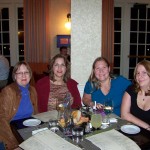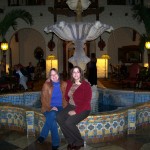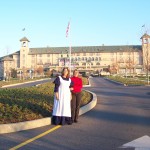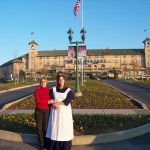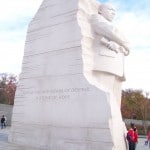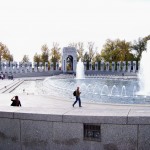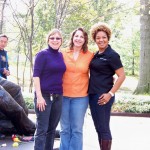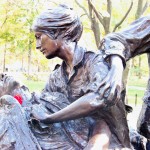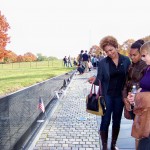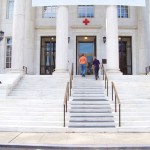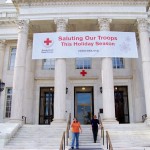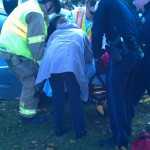by California Casualty | Nurses |
It was almost nine o’clock on Sunday morning and Joyce DeZutti was running late. Along with her daughters Giovanna and Antoinette and her friend Andrea Skillman, Joyce had just enjoyed a weekend of pampering at the spa and was headed back to the airport. Suddenly, her limo slowed and swung out to the side, veering out of the way to drive around a car accident. Out the window, the women saw two vehicles, one looking banged up and the other flipped over completely. Joyce turned to her daughter and asked if she’d seen an ambulance at the scene. As Giovanna responded that she had not, Joyce immediately yelled, “Stop now!” to the limo driver, lunging toward the partition to get his attention.
“There was no way that limo was going by that accident,” says DeZutti. “Even if I had to go through that partition, we were stopping. There was no question. We were supposed to be there.”
A series of very fateful events brought Joyce DeZutti to that Hershey highway that morning. Joyce, a psychiatric nurse at Linden Oaks Hospital, was more than 700 miles away from where she lives and works in Naperville, Illinois. About two months earlier, she was randomly picked out of more than 6,700 entrants as the winner of the California Casualty ‘Give a Nurse a Break Getaway.’ The grand prize was a two-day trip to the Hershey Hotel and Spa in Pennsylvania, a relaxing reward and much-deserved break from the daily grind of nursing. That morning, Joyce was headed back to the airport after a weekend of pampering and relaxation. If things had gone according to plan, Joyce would have missed the accident altogether.
“We wanted to get an early start. So we were really trying to leave. But my friend Andrea does Florence Nightingale presentations and she had her full costume with her and wanted to have pictures taken before we left,” remembers DeZutti. “So we got the pictures and got delayed by quite a bit. By the time we got in the limo, we had been rushed a bit and I was a little upset.”
As it turns out, Joyce DeZutti was exactly where she needed to be at exactly the right time. First responders had yet to arrive at the scene when the limo pulled up to the accident. Joyce, who was supposed to be getting a break from nursing life, suddenly felt herself thrust right back into the action.
“I threw my purse at my older daughter and said, ‘Get my kit out.’ And I ran to the scene, hollering out ‘I’m a nurse and my friend is too,’” says Joyce. After double-checking that someone had already called 911, she ran over to the flipped car. “I could see there was a woman hanging upside-down by her seatbelt. She was awake. I talked to her and said, ‘I’m Joyce and I’m a nurse.’”
The driver, an elderly woman, told Joyce she was having trouble breathing. The car smashed in around her and glass littering the asphalt, her seatbelt and coat making it difficult to breathe. So Joyce crawled in beside her.
“I had no problem getting in to her. I was laying on the ground next to the car with my hand reaching to her. She said she couldn’t breathe, which was no surprise with the angle her head was at,” recalls Joyce. “She had a big, heavy down pink coat, so I unzipped that and pulled her clothes away from her neck and put my hand on her chest and lifted up so she could lift her chin and she could breathe. I held her like that and just talked to her, holding her hand.”
While Joyce was worried about the patient, her daughter Giovanna was standing nearby worrying about her mother. Joyce had severely injured her arms while working with the horses she uses as therapy for her patients. Surgeries over the years had left pins and plates in her arms.
“I knew she could get hurt, too,” says Giovanna. “I have no doubt that if my mom didn’t have this problem with her arm, she could do it just fine because she’s a strong lady- mentally and physically. But I was concerned about her hurting herself and her being home and being in a lot of pain.”
But the adrenaline kept Joyce’s attention away from her own pain and focused on the patient. The woman asked Joyce to call her niece and asked if anyone else was hurt. As Joyce’s daughter Giovanna called the victim’s niece, firemen arrived at the scene. Meanwhile, Skillman, who works as nurse at the VA, explained to Joyce what was unfolding around her.
“It was like a Code Blue situation. Everyone has a job. I look back at what Joyce and I ended up doing, and it was sort of the same thing,” says Skillman. “She was doing the direct care and I was scoping out of the area and letting her know what the firemen were doing.”
A firefighter took Joyce’s place supporting the woman and Joyce slipped back out of the mangled car. But she wasn’t leaving.
“I said ‘I’m going to stay until they get her out of there,’’ remembers DeZutti. “I couldn’t leave not knowing. So I stayed.”
As firefighters used the “Jaws of Life” to cut away the passenger side of the car, a man in his fifties or sixties walked up to Andrea.
“He hands me a card of phone numbers to call and I grabbed the card, thinking they must be the patient’s phone numbers. He said they were and walked away,” says Skillman.
The man was the driver’s son. At the time, no one realized he had actually been in the car at the time of the accident.
“I asked if that was his mother and he said yes and that he was in there. He told me he had a seatbelt on. And a bystander confirmed he had helped get the man out of the car,” says DeZutti. So she went back into nurse mode. “I started talking to him really gently and I told him I was a nurse and wanted to check him. I did a head-to-toe and didn’t find anything tender and everything seemed fine.”
Firefighters put both occupants of the rolled car, the woman and her son, in C-collars on backboards and loaded them into the ambulance. But not before Joyce offered her final words of comfort.
“Joyce said she wanted to talk to her now that she was out of the car,” says Skillman. “But this patient was what my husband, a fireman, calls a ‘load and go.’ You don’t stick around. You put them in the ambulance and take off.”
So Joyce seized her moment, captured in this picture…
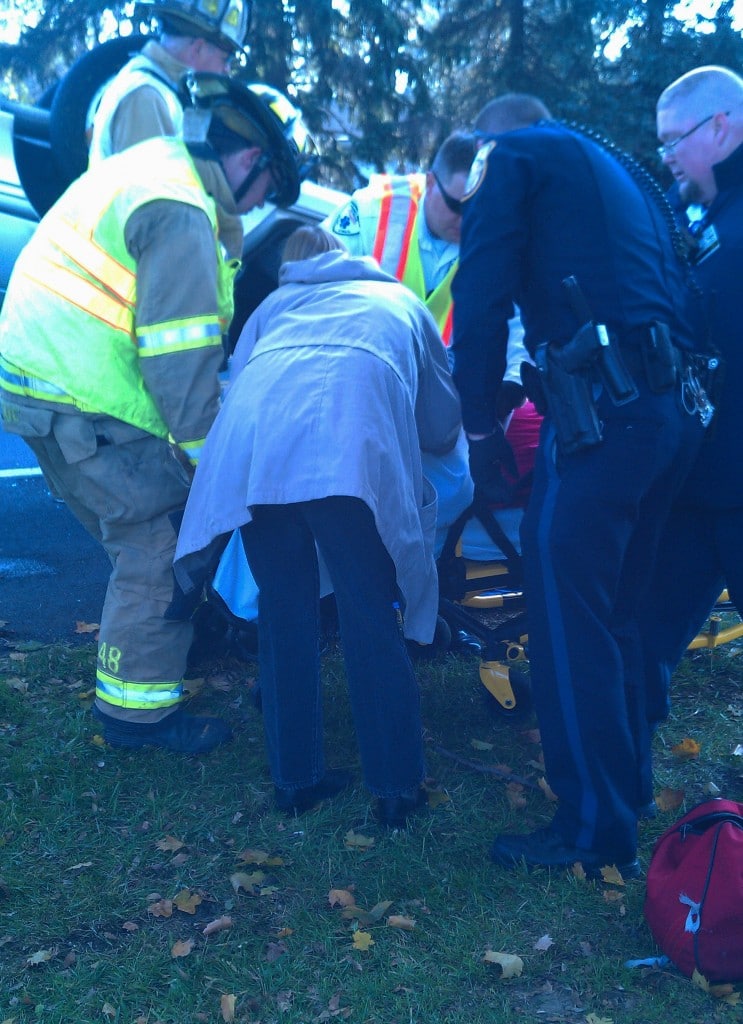 Photo Courtesy of Giovanna DeZutti, 2012
Photo Courtesy of Giovanna DeZutti, 2012
“I went to her and told her that her son was okay and that he was going to the hospital also to be checked over,” says DeZutti. “I said we had left messages with her family of where she was going to be.”
Joyce was the perfect person to pull up to the scene. A nurse for more than 30 years, she put herself through school by teaching taught EMTs and worked in a Trauma 1 Center and ICU. But to her daughter, Giovanna, up until that day she’d just been Mom.
“I’ve never seen my mom like that. My mom is my mom. My mom’s not a nurse to me,” says Giovanna. “But it was exciting watching her do it, because I’d never seen her doing anything like that. I’d seen maybe a call or two for a patient who was out of control, but this was totally different. It was a ‘bringing her back to the Emergency Room’ type of thing. She knew exactly what to do and what she was going to do ahead of time if this wasn’t working or that wasn’t working. It all came to her so fast. I could never do that. It was amazing. I see her more of a hero, now that I’ve seen her in action.”
But for Joyce, heroic action like this is the norm. This isn’t even the first time she’s stepped in to help an accident victim. When her kids were young, Joyce stopped to help another woman who was trapped upside-down in a rolled vehicle. She once witnessed a police officer get struck by a vehicle while directing traffic. She stopped to help him, too.
This story says something about nurses. We can try to give them a ‘break’ from their jobs. But stepping in and taking action to save lives is not just a part of their jobs. It’s a part of who they are.
Here’s where we need your help. When Joyce told us her story, we told her we would help her find out what happened to the woman and her son. But without knowing even the woman’s full name, although we believe her first name might be Jane, we’ve been unable to find her and check on her. If you know anyone in Pennsylvania, please pass Joyce’s story along and help us help this hero. After all, we figure it’s the least we can do to say ‘Thank You’ to this heroic nurse, Joyce DeZutti.
Do YOU know a Nurse, Firefighter, EMT, Peace Officer, or Educator Hero? Tell us about them!
To learn more about the Give a Nurse a Break Giveaway, click here.
Pictures from the Accident, The Hershey Spa, and the women in Washington D.C.:
All photos courtesy of Andrea Skillman and Giovanna DeZutti, 2012.
by California Casualty | Nominate a Hero |
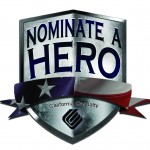 “We Protect American Heroes.”
“We Protect American Heroes.”
When I first started at California Casualty more than two years ago, this was our new company tagline. Wrapped up in a nice shiny package by an advertising agency, it looked great sitting there under our logo. Every other insurance company had their snazzy marketing hook – the hands, neighbors, and funny reptiles talking about savings—and I figured this was ours. New to this company and our customers, I thought this was just another catchy slogan.
But then I started interacting with our customers on Facebook and Twitter… and everything changed.
I started to hear the stories. Stories about struggling teachers who were paying for resources out of their own pockets because they just couldn’t stomach sacrificing quality education for budget cuts. Stories from nurses worked to the brink of exhaustion who continued to give patients the best care they could. Stories of firefighters who–even while mourning the loss of a brother–continued to follow their fellow firefighters into burning buildings. Stories of peace officers who laid their lives on the line to protect someone they had never even met.
Then the light went on. We’re not just selling car insurance here. We’re playing a small role in making the lives of some very important people better. We’re working hard to take one small thing, one small worry, off their plates. We’re protecting their homes and cars so they can get back to protecting us. Right then, I made it one of my goals to develop a program to reward these Heroes for what they do. More importantly, I wanted to honor them.
That’s why we created the “Nominate a Hero” contest. We envision a platform for people to say “Thank you” to these Heroes we are so honored to serve. On top of that, we wanted to add a chance for one Hero to win a once-in-a-lifetime trip, as a small token of our thanks.
I was a little worried starting out. How could I convince management to pay for this? I admit that I underestimated just how deeply the family culture runs at California Casualty. From the very beginning, every person I shared my vision with was thrilled to have the opportunity to thank our Heroes. Their enthusiasm is truly a testament to the honor and gratitude we derive from serving our customers.
Thank you for everything you do to make our communities better. Please take a moment to check out our contest, and enter as many deserving people as you can think of.
Sincerely,
Scott Randolph
Social Media Manager, California Casualty
__
To learn more about Nominate a Hero, or nominate your own hero, click here.
by California Casualty | Firefighters |
It was weird watching Hurricane Sandy through my front window rather than through the windshield of Rescue 5. It seems as though every major storm that passed through New England over the last twenty some odd years waited for me to start my tour. Sad truth is, I liked that just fine. It’s easy being alone during bad weather, even if the job you are doing is hard. This time, things were different; I had to ride it out at home.
Being home and helpless is difficult. As the winds picked up velocity and the branches of the trees, and the trees themselves shook, and shattered and fell to the ground I could do nothing but watch. My window was as close to the action as I would get, and I was not all that crazy about standing too close to that window! I found it difficult to sit still and watch things go flying by, but there was nothing I could do to change what was happening.
Nature’s fury is a little less intimidating thanks to advances in technology. By pressing a button we are able to track a storm, know when it’s coming, when it’s going, how much rain to expect, how strong the winds will be, and a whole bunch of other information like barometric pressure and things like that that mean absolutely nothing to me. What did matter was the fact that I knew that this too would pass, and the lights will come on, and hopefully stay on, and life will return to normal. This confidence in our ability to weather a storm is a luxury only afforded the most recent generation, prior to us people hunkered down when the wind blew, hopeful it would end, but not knowing if things would get worse before they got better.
Maybe things were better that way, and some fear was instilled in humanity. Humility and appreciation seem much more appetizing when not sure if at the next moment everything could end, or be forever changed. Alas, humility has never been my strength, and as I watched the chaos outside of my window I knew it would all be over soon. The TV told me so.
I’ve often said that it’s our families that deserve the credit when we are out doing our thing, but I never really believed it. I thought I believed it, and if questioned would vociferously defend that statement, but as the windows shook, and more branches fell, and another tree succumbed to the eighty mile an hour gusts, and my heart pounded a little harder than I thought possible, and I contemplated calling 911 to report trees in the wires, I realized just how much I had taken the family I left behind for granted. I was nervous, and worried, and it was not a feeling that I’m used to. My family was used to it, having been left alone during emergencies for years.
I enjoy nothing more that being called to action, and braving the elements while responding to some emergency or other. It’s an adrenaline rush like no other, fighting natures wrath on the way to save some poor soul from whatever predicament they find themselves in. Even the most wildly lived lives consist mostly of boring routine, and the chance to challenge the elements and make a difference and break the monotony is one I live for. Losing myself in an emergency is easy, and life affirming, and an enormous ego boost.
It’s a wonder I can even fit my head through the doorway of our home, where I weathered this storm, miserable, knowing that I was missing all of the fun.
And my wife stood by, busy with her routine, comfortable in her place, batteries ready, candles where they needed to be, dinner for days prepared, ice in the cooler, crossword puzzle books and some games next to the battery operated radio.
She was prepared. I was not. Somewhere in my thick skull the notion that I was above commoners in terms of severe weather readiness resided. Let the hurricanes, blizzards, heat waves, tornadoes and earthquakes come; I am ready, willing and able to respond to those emergencies! But prepare for them? Not even close. Preparation is dull, part of that 90% monotony called life. Preparation for things that “might” happen is far different than responding to things that “did” happen.
In my arrogance I failed to allow myself to live a moment in my families shoes. It is frightening enough to be at the mercy of the elements, hoping that the walls keep the weather out, and the basement stays dry, and the roof remains in place. Hunkering down during a storm is highly underrated. It takes more courage than I ever imagined, and I cannot begin to imagine one of us being out during the worst of it. I honestly don’t think I have what it takes to keep the home together, and stocked, and prepared. Sure, I can put beer in the fridge, and get cans of tuna and a manual opener, but can I keep my emotions in check when the house is shaking and the person I love is not there?
Being prepared is harder than responding. True strength of character is necessary, as well as leadership, courage, and faith. Anybody can take care of things after they happen, waiting for and being ready for anything that might happen, and doing so when you are terrified and your other half is gone takes a special person.
Storms will come, and storms will go, and each one is different in its intensity and potential for inflicting damage. Hurricane Sandy was a doozy, blazing a path of death and destruction through the eastern states. Truly heroic acts were performed by our first responders, and I watched the events over and over on my TV, proud to be part of that world, all the while humbled and awed by the heroes under my own roof.
________
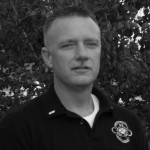 Captain Michael Morse is a Rescue Captain in the Providence Fire Department’s rescue unit and author of two books: “Rescuing Providence” and “Responding.” His blog was voted the winner of the 2012 CalCas Battle of the Blogs ‘Top Firefighter & EMT Blog.’ Cpt. Morses’s books & blog are great resources for EMTs and Firefighters- full of advice, news briefs, and day-to-day insider stories. To learn more about Captain Morse, check out our interview with him!
Captain Michael Morse is a Rescue Captain in the Providence Fire Department’s rescue unit and author of two books: “Rescuing Providence” and “Responding.” His blog was voted the winner of the 2012 CalCas Battle of the Blogs ‘Top Firefighter & EMT Blog.’ Cpt. Morses’s books & blog are great resources for EMTs and Firefighters- full of advice, news briefs, and day-to-day insider stories. To learn more about Captain Morse, check out our interview with him!
by California Casualty | Firefighters |
With 58 injured survivors and 12 fatalities, the Paramedics who responded to the Aurora theatre on July 20, 2012 were dealt a chaotic scene. The professional job in front of them was immense, to say nothing of how they must have been feeling on a personal level.
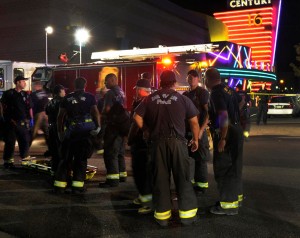
(Photo: Karl Gehring/The Denver Post )
To get some perspective on what an event such as this is like for a Paramedic, I headed to our Top Fire & EMT Blog: Rescuing Providence. Rescuing Providence is run by Captain Morse, is a Rescue Captain in Providence.
On his site site, Captain Morse has posted his thoughts and responses to Aurora, speaking as an EMT. I’ve included a few particularly poignant excerpts here, but head to Rescuing Providence to read the text in full.
When sorting through the bodies, and separating the living from the dead, then prioritizing those who survived, and those who probably will not, focus is key. Having a job to do, one that years of training and experience has prepared you for makes the images and sounds manageable, work to be done, wounds to heal, lives to save.
Moments such as those in Aurora, Colorado will never happened to the vast majority of people. These are isolated incidents, pockets of madness that crept up on some other people. But those people do exist, and they are no different from you or I, had no warning, have no answers and will live the rest of their lives flashing back to those pivotal moments.
Now that the shooting is over, and the healing begins, people will look to the police, medics, nurses, doctors and firefighters who responded to the scene for direction. How we act, and how we cope, and how we get on with our lives is of vital importance to those poor souls drowning in an ocean of grief.
There is always more work to do.
To read Captain Morse’s post in full, click here.
Our sincere Thanks to Captain Morse for allowing us to reproduce parts of his post in this blog posting.
by California Casualty | Nurses |
Transporting the injured from the scene in Aurora was just the first step.
From there, they were received by the caring arms of the Nurses and medical staff in various Denver hospitals.
That early morning, survivors began the long and hard journey towards recovery.
And standing beside them are Nurses. Nurses who see first-hand the physical pain of survivors and the emotional pain of survivors, their families and their friends.
Nurses, too, must process their own grief as they struggle to understand this tragedy and support those whose survival is now in their hands.
Eric Young, Jr., a second baseman and outfielder for the Colorado Rockies who recently visited survivors in the hospital, said it best:

To hear more about tragic events such as Aurora from a Nursing perspective, I headed to Nurse Keith Carlson’s Nursing blog Digital Doorway.
Nurse Keith has written a beautiful post entitled “Of Tragedy, Heroism and Recovery.” While you’ll have to click on the link to see all of his thoughts and reflections, I thought I’d highlight some of his strongest statements here.
When events like this occur in our midst, we frequently do not consider the impact that it has on the first responders who initially respond to such traumatic events, as well as the hospital staff, surgeons and nurses who deal with the (often prolonged and painful) aftermath.
Since I’m a nurse who coaches and advises nurses on self care, burnout prevention and overall health and wellness, I’d like to take a moment to consider how nurses and their healthcare colleagues themselves react to such traumatic events, especially when standing on the front lines.
In the case of the Aurora massacre, one can only imagine what might be going through the minds of the nurses and other staff members of the hospitals on the receiving end of the racing ambulances. Were their friends and neighbors among the dead or injured? Would a colleague be one of the critical patients rushed from the scene in need of life-saving assistance? How would it feel to see a favorite teacher or local barista bloodied and fighting for her life as the sirens announced their arrival through the emergency department doors?
The ripple of trauma is wide in a scenario such as Aurora, and we hope that the paramedics, nurses, surgeons and others who treated—and are still treating—the injured are taking care of themselves even as they care for those in need of their professional skills and expertise.
Those frontline medical personnel need to remember to hydrate well, eat nutritious food, take time for self care, practice good sleep hygiene, and spend time away from work where the stresses of this traumatic event can be briefly set aside. For those who are prone to give until it hurts—and then give some more—it’s a high priority to get away, debrief with friends, family and colleagues, and allow the nervous system to recalibrate.
My sincere thanks to Nurse Keith for allowing me to discuss his tips and insights in this blog post.
 Photo Courtesy of Giovanna DeZutti, 2012
Photo Courtesy of Giovanna DeZutti, 2012
